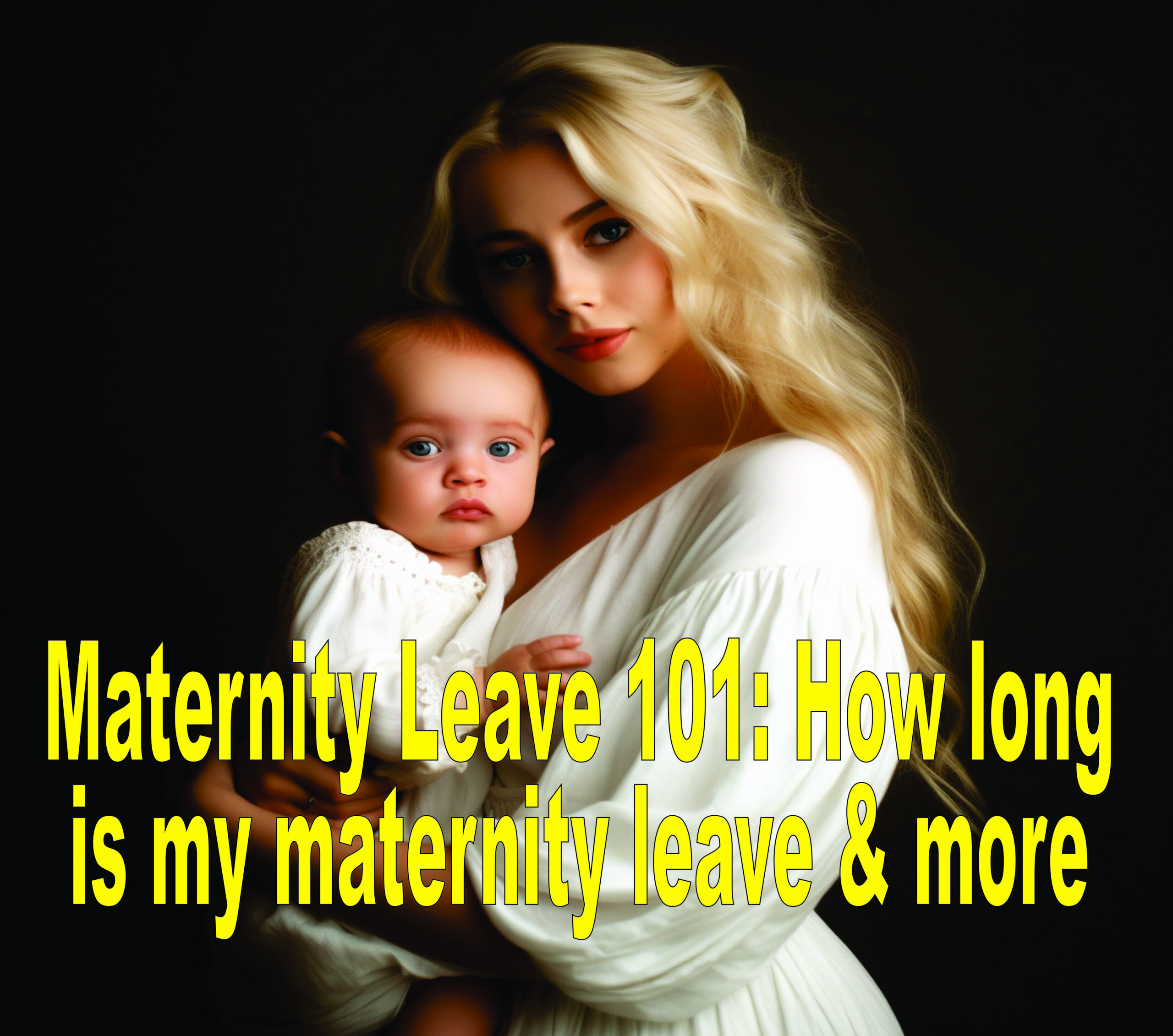Last Updated on January 29, 2024 by Lori Pace
Congratulations! This is an exciting time since you’re welcoming a new addition to your family. However, you are probably wondering about the classic working mother question: Will my maternity leave be granted?
The maze of maternity leave in America can be confusing. Although efforts are being made to increase paid maternity leave for more mothers, especially at state level, only 16% of employees in the private sector have access to paid leave. You may have heard that the USA is the only developed nation without paid maternity leaves. It’s true and worth repeating.
How long is my maternity leave?
The Family and Medical Leave Act (FMLA) allows workers to take up to 12 workweeks in a 12-month period for parental leave to care for a newborn. Your job is protected in the meantime, although your employer isn’t required to pay you for maternity leave.

FAQ’s:
Is there any law that guarantees me the right to use maternity leave? Is it required by law that my employer offer it?
The Family and Medical Leave Act is the most important law. This federal law guarantees parents unpaid time off following a child’s birth, adoption, or foster placement. Not all employees are entitled to FMLA leave. You may not be covered if you work for a private company with less than 50 employees. If you work for the government, or in a large company, you may be covered, provided you have worked at least 1,250 hours during the past 12 months. If you’re covered by FMLA and you comply with its requirements, you have to document your pregnancy/birth/adoption and give proper notice. Your employer has to give you up to 12 weeks of unpaid, job-protected maternity leave.
Some states have laws that guarantee that you can take maternity leave and also receive paid leave. Although they are rare, California, Massachusetts, New Jersey, New York, Rhode Island, Washington, DC, and Connecticut currently require them. Oregon will be in 2023, and Colorado in 2024.
After Congress passed the measure in December 2019, the nation’s 2.1million federal employees now have 12 weeks of paid parental leaves.
Your employer can grant you maternity leaves if you are not covered under FMLA or any state law. It is a good idea, early on, to discuss this with your boss and to create a plan for taking time off work and then returning to work. In the worst-case scenario, ask your boss if you can save vacation, sick, or other personal time to use after your baby is born.
When should I speak to my boss about maternity leave?
The sooner you act, the better. It can be difficult to speak with your boss. You’re setting yourself up for coverage and transition if you discuss your needs upfront.
You must notify your employer 30 days in advance if you plan to take FMLA leave. Talk to your boss at least 30 days before your planned leave to fill out all paperwork and begin planning for it. You must notify your employer if you have to take leave sooner than you expected due to unforeseeable circumstances. If you go into labor more than two months before the due date, notify your employer immediately so that everyone is safe.
Are there any other things I can do to prepare for my maternity leave?
Research and planning are key! It’s recommended to check your employee handbook for information about the company’s policies on maternity leave. Once you have a clear understanding of your rights, it is important to complete any paperwork required by your employer to allow you to use maternity leave.
What will my maternity leave cost?
It depends. Many employers offer paid leave for new mothers, and sometimes fathers. Check your employee handbook to find out if your employer offers paid time off. Employers that offer paid leave often require you to use your accrued vacation or sick time before you can take advantage of their paid maternity leaves. This is a good way to plan ahead and maximize your earnings. You may also want to keep your paid time off in order to prolong your maternity leave.
If you are lucky enough to be able to work in a state with paid leave, then you will get at least part of your salary for your leave.
Are there any taxes that I must pay on my maternity leave?
Yes, your employer may pay you while you are on leave. This is taxable income just like if you worked every day. Employers may pay for disability benefits. This income is also taxable. You are exempted if you pay for your own disability benefits.
You said something about disability leave? How does that work?

Employers may pay for your maternity leaves through a short-term disability policy. This could be part of your benefits package. You may pay the employer for the policy. This policy should be in place before you get pregnant.
A short-term disability policy will pay you some of your salaries if you are pregnant or have to stop working because you have medical reasons. To collect under the policy, you must have a medical reason. Some policies also consider the time it takes to recover from a birth a “disability” so you may get paid for several additional weeks.
You can use short-term disability income to cover your maternity leave. Make sure you plan ahead. Find out if you have one and if you will need to purchase supplemental insurance to receive 100% of your salary while on leave. Also, find out if your policy covers maternity leave.
How about the benefits? Do I need to worry about my health insurance while I’m out on maternity leave?
FMLA requires that covered employers continue to cover your health insurance even if you are on leave. You must continue to pay the co-pay if you pay it regularly.
FMLA doesn’t require employers to count the days you are on leave towards seniority benefits or Paid time off (PTO) unlike some state laws.
What if I’m adopting or using a surrogate? Am I still entitled to maternity leave?
You should also check your employee handbook for information about paid leave. FMLA allows new parents to bond with their child for 12 weeks without paying if they are adoptive, surrogate, or birth parents.
What if my new child isn’t an infant? Can I still get maternity leave?
Yes, according to the FMLA and certain state laws, employees who adopt a child (even an infant) may take up to 12 weeks of unpaid leave.
Can my partner take parental leave, too?
His/her employer’s policies will determine the terms of his/her parental leave. Some employers offer paid leave to parents, regardless of gender or whether they have had children. Some states will pay your partner if the state doesn’t offer parental leave. If your partner is eligible for FMLA, they can take unpaid leave up to 12 weeks.
When should I start my maternity leave?
This is a difficult question to ask, especially if you don’t know what you will feel at the end of your pregnancy. Some parents prefer to keep all of their leave until after the baby is born. Some parents may prefer to take some time off before the child is born, especially if it is near the end of a pregnancy. If you take FMLA leave, give your employer at most 30 days’ notice if your leave will be foreseeable.
If I want more time off, how can I extend my maternity leave?
It will depend on the employer. Employers may offer short-term disability and allow for an extension of maternity leaves if it is related to a pregnancy or childbirth-related problem. You should also check with your HR department to see if your employer has any other options than what they offer voluntarily. While some employers might be happy to not have to pay you for a long period, others will count the days until your return.
What if I take maternity leave and get fired when I’m away from work?
An employer who has an employee on parental leave may not be fired in certain countries. The United States is different. However, FMLA states that your employer cannot legally retaliate against your taking time off, nor can she discriminate against your taking legal leave.
An employer cannot discriminate against a pregnant employee because of their pregnancy, childbirth, or any other medical condition. This means that you are legally protected if your employer doesn’t support your family. An employer can also fire employees for reasons not related to the birth or leave, such as mass layoffs.
Contact the Center for WorkLife Law’s national hotline if you are fired for being pregnant or for maternity leave discrimination. An excellent attorney will be assigned to you in your local area. They can help you protect your rights. While it may be your first choice to get a job, you have good chances of winning in court.
Right now I’m not sure whether I want to return to work or stay home with my baby. Should I tell my boss that upfront? What happens if I make that decision during my maternity leave?
You can better plan for similar situations if you are aware of the issues that others have faced.
Be clear about whether paid maternity leave is contingent on you returning to work before you suggest that you might not return. You should inform your employer that you are not returning to work as soon as possible so they can plan for your transition. As with all things, it is important to consult your employee handbook, if you take paid leave under a company policy, to see if the employer will require reimbursement if you do not return. Employers may request reimbursement for benefits expenses that they paid to you while you were on FMLA leave.
According to California attorney and employment lawyer expert, Lisa Pierson Weinberger, think about what you might be told by your employer about you to future bosses. Weinberger says that while employers tend to be cautious about what they tell former employees, it is important to give as much notice as possible and be as helpful in answering questions and helping to transfer her work to her replacement.

